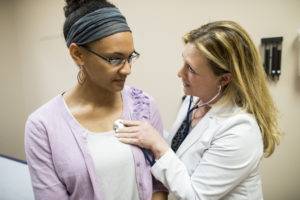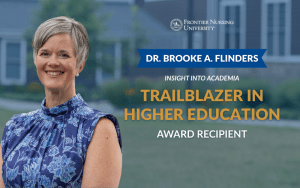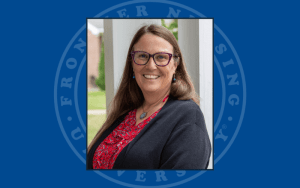 This week the healthcare community will come together to celebrate National Nurse Practitioner Week, created to honor the dedicated men and women who work hard on the frontlines to care for their fellow citizens. The Frontier Nursing University (FNU) community is excited to celebrate this year as a part of its Family Nurse Practitioner Program (FNP) 50th anniversary. The program was the first of its kind in the United States developed by FNU to extend more comprehensive care to American families.
This week the healthcare community will come together to celebrate National Nurse Practitioner Week, created to honor the dedicated men and women who work hard on the frontlines to care for their fellow citizens. The Frontier Nursing University (FNU) community is excited to celebrate this year as a part of its Family Nurse Practitioner Program (FNP) 50th anniversary. The program was the first of its kind in the United States developed by FNU to extend more comprehensive care to American families.
To look back on their journey as the first University to offer the FNP, FNU asked some of its faculty to weigh in on what they love about the program and what makes FNU such a unique place to teach, learn, and grow.
Here is what they had to share:
What is the most rewarding part of educating our future family nurse practitioners?
“I feel like I make a difference! I have sought a way to impact change in my career, and it feels like I am doing that when I teach those who are caring for communities across the world. I love when people tell me I have impacted the way they see nursing, patient care or APRN practice. It is an honor to do this work.” – Joanne Keefe, assistant professor, course coordinator for PC702 (EPI and Biostats)
“Our graduates are the future. Knowing that we are an integral part of the process is the most rewarding part of educating our future FNPs!” – Ruth Elsasser, course faculty in PC707
“Seeing the students grow into proficient nurse practitioners that can manage patient needs with care and compassion.” – Amber Littlefield, assistant professor
“I have confidence that I am passing the torch to FNPs who are exceptionally well prepared to care for our most vulnerable persons. I genuinely believe our graduates will reduce the inequities and disparities that prevent every American from receiving critical care.” -Kathy Gardner, full-time course faculty, PC718
What drives your passion for teaching?
“My passion is driven by a calling to serve nurses, as I care for patients: by bringing expertise, evidence, and shared-decision making, in a holistic framework, considering the needs of each individual concerning their environment. I seek to understand and provide opportunities to deepen learning by being open, honest, and approachable.” -Kathy Gardner, full-time course faculty, PC718
“Interacting with students is the most rewarding part of the job. Every single student is here to make this world a better place. Watching the students work so hard to earn a spot at the table, being part of the solution is genuinely awe-inspiring.”- Rhonda Arthur, faculty and course coordinator
“My love of learning and the profession itself makes me passionate about teaching and drives me to improve each term. I learn every day as I research new materials for the course, read recent articles, listen to the students as they share information. I know I can make a difference to a student by sharing my own stories, letting them know that I was once where they are and that they can make it through this rigorous program.” -Vicky Stone-Gale, course coordinator for NP702-primary care
“My underlying passion is to change the spirit of the nursing profession into one of kindness, respect, and support for patients and colleagues. I try to model this and encourage everyone that it really could be this way. It starts with you.” -Joanne Keefe, assistant professor, course coordinator for PC702 (EPI and Biostats)
Why did you decide to become an FNU Faculty member?
“FNU has a reputation in training its students as no other program has. Their graduates are practicing throughout the country, and when you meet them, they tell you about the wonderful experience they had at FNU. The faculty and administrators at FNU are highly experienced clinicians and educators and have a reputation in the community for being some of the best in the country”. -Vicky Stone-Gale, course coordinator for NP702-primary care
“Because of my faculty at FNU! I wanted to be just like them.” -Dr. Mary K. Jones, FNP RCF
“I was an FNU student and fell in love with the school. I love the passion for education in this environment.”- Amber Littlefield, assistant professor
“After graduating from FNU with my DNP and experiencing the faculty member’s dedication to student success, I knew that I had found my place; my home.” -Ruth Elsasser, course faculty in PC707
What drove you to the Family Nurse Practitioner field?
“I had always wanted to go to medical school, but as a divorced mother of three, that was not going to be feasible. I knew I needed to advance my nursing education, so, thirty-two years ago, I applied to an MSN program. During my interview, the program director told me about their new program- A Master’s in Nursing with a Family Nurse Practitioner track. My interviewer informed me that if I completed this new program, I would assess, diagnose, and treat patients just like physicians. I was so excited that I immediately enrolled. I have never once regretted it.” -Vicky Stone-Gale, course coordinator for NP702-primary care
“I wanted to contribute to providing the sensitive and competent care that I saw as lacking to vulnerable persons. I enjoy caring for individuals from infancy to geriatric, from all walks of life.”- Kathy Gardner, full-time course faculty, PC718
“I wanted to make a difference. I loved the work of being an RN but wanted more autonomy and the ability to touch people’s lives my way, using science, knowledge, passion, intuition, and integrity. For me, it is a life purpose worthy of pursuit.”- Joanne Keefe, assistant professor, course coordinator for PC702 (EPI and Biostats)
Another exciting way that FNU will participate in National Nurse Practitioner week is by joining the Institute for Healthcare Improvement’s (IHI) Open School Chapter on Tuesday, Nov. 10, at 8 pm EST for a virtual event hosted by the Right Care Alliance (RCA). Tuesday’s event will consist of study groups discussing various important healthcare topics facing the industry today. Anyone interested in the American healthcare system and health policy is welcome to sign up for the study groups.
To find out more about FNU’s groundbreaking FNP program, visit the University’s FNP page. Have a wonderful week celebrating the power of nurse practitioners and frontline workers who have put forward so much compassion and grace throughout this challenging year.






















 Carrie Belin is an experienced board-certified Family Nurse Practitioner and a graduate of the Johns Hopkins DNP program, Johns Hopkins Bloomberg School of Public Health, Georgetown University School of Nursing, and Johns Hopkins School of Nursing. She has also completed fellowships at Georgetown and the University of California Irvine.
Carrie Belin is an experienced board-certified Family Nurse Practitioner and a graduate of the Johns Hopkins DNP program, Johns Hopkins Bloomberg School of Public Health, Georgetown University School of Nursing, and Johns Hopkins School of Nursing. She has also completed fellowships at Georgetown and the University of California Irvine. Angie has been a full-scope midwife since 2009. She has experience in various birth settings including home, hospital, and birth centers. She is committed to integrating the midwifery model of care in the US. She completed her master’s degree in nurse-midwifery at Frontier Nursing University (FNU) and her Doctorate at Johns Hopkins University. She currently serves as the midwifery clinical faculty at FNU. Angie is motivated by the desire to improve the quality of healthcare and has led quality improvement projects on skin-to-skin implementation, labor induction, and improving transfer of care practices between hospital and community midwives. In 2017, she created a short film on skin-to-skin called
Angie has been a full-scope midwife since 2009. She has experience in various birth settings including home, hospital, and birth centers. She is committed to integrating the midwifery model of care in the US. She completed her master’s degree in nurse-midwifery at Frontier Nursing University (FNU) and her Doctorate at Johns Hopkins University. She currently serves as the midwifery clinical faculty at FNU. Angie is motivated by the desire to improve the quality of healthcare and has led quality improvement projects on skin-to-skin implementation, labor induction, and improving transfer of care practices between hospital and community midwives. In 2017, she created a short film on skin-to-skin called 










 Justin C. Daily, BSN, RN, has ten years of experience in nursing. At the start of his nursing career, Justin worked as a floor nurse on the oncology floor at St. Francis. He then spent two years as the Director of Nursing in a small rural Kansas hospital before returning to St. Francis and the oncology unit. He has been in his current position as the Chemo Nurse Educator for the past four years. He earned an Associate in Nurse from Hutchinson Community College and a Bachelor of Science in Nursing from Bethel College.
Justin C. Daily, BSN, RN, has ten years of experience in nursing. At the start of his nursing career, Justin worked as a floor nurse on the oncology floor at St. Francis. He then spent two years as the Director of Nursing in a small rural Kansas hospital before returning to St. Francis and the oncology unit. He has been in his current position as the Chemo Nurse Educator for the past four years. He earned an Associate in Nurse from Hutchinson Community College and a Bachelor of Science in Nursing from Bethel College. Brandy Jackson serves as the Director of Undergraduate Nursing Programs and Assistant Educator at Wichita State University and Co-Director of Access in Nursing. Brandy is a seasoned educator with over 15 years of experience. Before entering academia, Brandy served in Hospital-based leadership and Critical Care Staff nurse roles. Brandy is passionate about equity in nursing education with a focus on individuals with disabilities. Her current research interests include accommodations of nursing students with disabilities in clinical learning environments and breaking down barriers for historically unrepresented individuals to enter the nursing profession. Brandy is also actively engaged in Interprofessional Education development, creating IPE opportunities for faculty and students at Wichita State. Brandy is an active member of Wichita Women for Good and Soroptimist, with the goal to empower women and girls. Brandy is a TeamSTEPPS master trainer. She received the DASIY Award for Extraordinary Nursing Faculty in 2019 at Wichita State University.
Brandy Jackson serves as the Director of Undergraduate Nursing Programs and Assistant Educator at Wichita State University and Co-Director of Access in Nursing. Brandy is a seasoned educator with over 15 years of experience. Before entering academia, Brandy served in Hospital-based leadership and Critical Care Staff nurse roles. Brandy is passionate about equity in nursing education with a focus on individuals with disabilities. Her current research interests include accommodations of nursing students with disabilities in clinical learning environments and breaking down barriers for historically unrepresented individuals to enter the nursing profession. Brandy is also actively engaged in Interprofessional Education development, creating IPE opportunities for faculty and students at Wichita State. Brandy is an active member of Wichita Women for Good and Soroptimist, with the goal to empower women and girls. Brandy is a TeamSTEPPS master trainer. She received the DASIY Award for Extraordinary Nursing Faculty in 2019 at Wichita State University.  Dr. Sabrina Ali Jamal-Eddine is an Arab-disabled queer woman of color with a PhD in Nursing and an interdisciplinary certificate in Disability Ethics from the University of Illinois Chicago (UIC). Dr. Jamal-Eddine’s doctoral research explored spoken word poetry as a form of critical narrative pedagogy to educate nursing students about disability, ableism, and disability justice. Dr. Jamal-Eddine now serves as a Postdoctoral Research Associate in UIC’s Department of Disability and Human Development and serves on the Board of Directors of the National Organization of Nurses with Disabilities (NOND). During her doctoral program, Sabrina served as a Summer Fellow at a residential National Endowment of the Humanities (NEH) Summer Institute at Arizona State University (2023), a summer fellow at Andrew W. Mellon’s National Humanities Without Walls program at University of Michigan (2022), a Summer Research Fellow at UC Berkeley’s Othering & Belonging Institute (2021), and an Illinois Leadership Education in Neurodevelopmental and related Disabilities (LEND) trainee (2019-2020).
Dr. Sabrina Ali Jamal-Eddine is an Arab-disabled queer woman of color with a PhD in Nursing and an interdisciplinary certificate in Disability Ethics from the University of Illinois Chicago (UIC). Dr. Jamal-Eddine’s doctoral research explored spoken word poetry as a form of critical narrative pedagogy to educate nursing students about disability, ableism, and disability justice. Dr. Jamal-Eddine now serves as a Postdoctoral Research Associate in UIC’s Department of Disability and Human Development and serves on the Board of Directors of the National Organization of Nurses with Disabilities (NOND). During her doctoral program, Sabrina served as a Summer Fellow at a residential National Endowment of the Humanities (NEH) Summer Institute at Arizona State University (2023), a summer fellow at Andrew W. Mellon’s National Humanities Without Walls program at University of Michigan (2022), a Summer Research Fellow at UC Berkeley’s Othering & Belonging Institute (2021), and an Illinois Leadership Education in Neurodevelopmental and related Disabilities (LEND) trainee (2019-2020). Vanessa Cameron works for Vanderbilt University Medical Center in Nursing Education & Professional Development. She is also attending George Washington University and progressing towards a PhD in Nursing with an emphasis on ableism in nursing. After becoming disabled in April 2021, Vanessa’s worldview and perspective changed, and a recognition of the ableism present within healthcare and within the culture of nursing was apparent. She has been working since that time to provide educational foundations for nurses about disability and ableism, provide support for fellow disabled nursing colleagues, and advocate for the disabled community within healthcare settings to reduce disparities.
Vanessa Cameron works for Vanderbilt University Medical Center in Nursing Education & Professional Development. She is also attending George Washington University and progressing towards a PhD in Nursing with an emphasis on ableism in nursing. After becoming disabled in April 2021, Vanessa’s worldview and perspective changed, and a recognition of the ableism present within healthcare and within the culture of nursing was apparent. She has been working since that time to provide educational foundations for nurses about disability and ableism, provide support for fellow disabled nursing colleagues, and advocate for the disabled community within healthcare settings to reduce disparities. Dr. Lucinda Canty is a certified nurse-midwife, Associate Professor of Nursing, and Director of the Seedworks Health Equity in Nursing Program at the University of Massachusetts Amherst. She earned a bachelor’s degree in nursing from Columbia University, a master’s degree from Yale University, specializing in nurse-midwifery, and a PhD from the University of Connecticut. Dr. Canty has provided reproductive health care for over 29 years. Her research interests include the prevention of maternal mortality and severe maternal morbidity, reducing racial and ethnic health disparities in reproductive health, promoting diversity in nursing, and eliminating racism in nursing and midwifery.
Dr. Lucinda Canty is a certified nurse-midwife, Associate Professor of Nursing, and Director of the Seedworks Health Equity in Nursing Program at the University of Massachusetts Amherst. She earned a bachelor’s degree in nursing from Columbia University, a master’s degree from Yale University, specializing in nurse-midwifery, and a PhD from the University of Connecticut. Dr. Canty has provided reproductive health care for over 29 years. Her research interests include the prevention of maternal mortality and severe maternal morbidity, reducing racial and ethnic health disparities in reproductive health, promoting diversity in nursing, and eliminating racism in nursing and midwifery. Dr. Lisa Meeks is a distinguished scholar and leader whose unwavering commitment to inclusivity and excellence has significantly influenced the landscape of health professions education and accessibility. She is the founder and executive director of the DocsWithDisabilities Initiative and holds appointments as an Associate Professor in the Departments of Learning Health Sciences and Family Medicine at the University of Michigan.
Dr. Lisa Meeks is a distinguished scholar and leader whose unwavering commitment to inclusivity and excellence has significantly influenced the landscape of health professions education and accessibility. She is the founder and executive director of the DocsWithDisabilities Initiative and holds appointments as an Associate Professor in the Departments of Learning Health Sciences and Family Medicine at the University of Michigan. Dr. Nikia Grayson, DNP, MSN, MPH, MA, CNM, FNP-C, FACNM (she/her) is a trailblazing force in reproductive justice, blending her expertise as a public health activist, anthropologist, and family nurse-midwife to champion the rights and health of underserved communities. Graduating with distinction from Howard University, Nikia holds a bachelor’s degree in communications and a master’s degree in public health. Her academic journey also led her to the University of Memphis, where she earned a master’s in medical anthropology, and the University of Tennessee, where she achieved both a master’s in nursing and a doctorate in nursing practice. Complementing her extensive education, she completed a post-master’s certificate in midwifery at Frontier Nursing University.
Dr. Nikia Grayson, DNP, MSN, MPH, MA, CNM, FNP-C, FACNM (she/her) is a trailblazing force in reproductive justice, blending her expertise as a public health activist, anthropologist, and family nurse-midwife to champion the rights and health of underserved communities. Graduating with distinction from Howard University, Nikia holds a bachelor’s degree in communications and a master’s degree in public health. Her academic journey also led her to the University of Memphis, where she earned a master’s in medical anthropology, and the University of Tennessee, where she achieved both a master’s in nursing and a doctorate in nursing practice. Complementing her extensive education, she completed a post-master’s certificate in midwifery at Frontier Nursing University.









 Dr. Tia Brown McNair is the Vice President in the Office of Diversity, Equity, and Student Success and Executive Director for the Truth, Racial Healing, and Transformation (TRHT) Campus Centers at the American Association of Colleges and Universities (AAC&U) in Washington, DC. She oversees both funded projects and AAC&U’s continuing programs on equity, inclusive excellence, high-impact practices, and student success. McNair directs AAC&U’s Summer Institutes on High-Impact Practices and Student Success, and TRHT Campus Centers and serves as the project director for several AAC&U initiatives, including the development of a TRHT-focused campus climate toolkit. She is the lead author of From Equity Talk to Equity Walk: Expanding Practitioner Knowledge for Racial Justice in Higher Education (January 2020) and Becoming a Student-Ready College: A New Culture of Leadership for Student Success (July 2016 and August 2022 Second edition).
Dr. Tia Brown McNair is the Vice President in the Office of Diversity, Equity, and Student Success and Executive Director for the Truth, Racial Healing, and Transformation (TRHT) Campus Centers at the American Association of Colleges and Universities (AAC&U) in Washington, DC. She oversees both funded projects and AAC&U’s continuing programs on equity, inclusive excellence, high-impact practices, and student success. McNair directs AAC&U’s Summer Institutes on High-Impact Practices and Student Success, and TRHT Campus Centers and serves as the project director for several AAC&U initiatives, including the development of a TRHT-focused campus climate toolkit. She is the lead author of From Equity Talk to Equity Walk: Expanding Practitioner Knowledge for Racial Justice in Higher Education (January 2020) and Becoming a Student-Ready College: A New Culture of Leadership for Student Success (July 2016 and August 2022 Second edition).